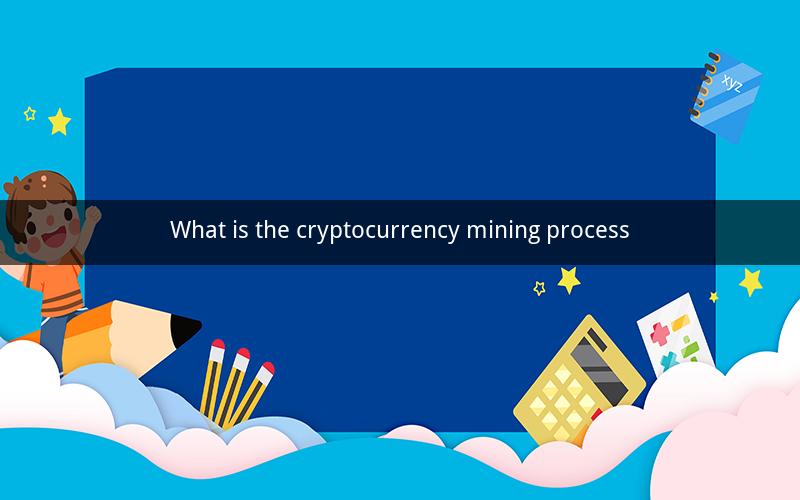
Table of Contents
1. Introduction to Cryptocurrency Mining
2. The Importance of Cryptocurrency Mining
3. Understanding the Mining Process
4. Hardware and Software Requirements
5. The Role of Algorithms
6. The Mining Pool Concept
7. Mining Pools vs. Independent Mining
8. The Energy Consumption of Mining
9. The Economic Aspect of Mining
10. The Future of Cryptocurrency Mining
1. Introduction to Cryptocurrency Mining
Cryptocurrency mining is the process of validating and adding new transactions to a blockchain. Miners use specialized hardware and software to solve complex mathematical problems, which in return reward them with cryptocurrency tokens. This process is crucial for maintaining the integrity and security of the blockchain network.
2. The Importance of Cryptocurrency Mining
Mining ensures the security and stability of the blockchain network. It prevents fraud, doubles spending, and maintains the integrity of the ledger. Moreover, mining helps to distribute new coins to the network participants, thereby supporting the overall growth and sustainability of the cryptocurrency ecosystem.
3. Understanding the Mining Process
The mining process involves several steps, including:
a. Receiving a block of transactions
b. Solving a mathematical puzzle
c. Receiving a reward
d. Adding the new block to the blockchain
4. Hardware and Software Requirements
To participate in mining, you need specialized hardware and software. The hardware requirements include a powerful graphics processing unit (GPU) or an application-specific integrated circuit (ASIC). The software requirements include a mining client, which connects your hardware to the blockchain network.
5. The Role of Algorithms
Algorithms play a crucial role in the mining process. They determine the complexity of the mathematical puzzles that miners must solve. Different cryptocurrencies use different algorithms, such as SHA-256 for Bitcoin and Scrypt for Litecoin.
6. The Mining Pool Concept
Mining pools are groups of miners who work together to solve complex mathematical puzzles. When a pool solves a puzzle, the rewards are distributed among the pool members based on their contribution. Mining pools increase the chances of earning rewards, as they combine the computing power of multiple miners.
7. Mining Pools vs. Independent Mining
Mining pools offer several advantages over independent mining. First, they provide a more consistent income stream, as rewards are distributed regularly. Second, they reduce the risk of not receiving any rewards, as independent miners may go for extended periods without finding a block. However, mining pools also charge a fee for their services.
8. The Energy Consumption of Mining
Mining is an energy-intensive process. The more powerful the hardware, the more energy it consumes. This has raised concerns about the environmental impact of mining. However, as the cost of electricity continues to decrease, the overall impact of mining on the environment may diminish.
9. The Economic Aspect of Mining
Mining can be a profitable venture, but it's essential to consider the economic aspects. The profitability of mining depends on various factors, including the cost of electricity, the price of the cryptocurrency, and the mining difficulty. It's crucial to conduct thorough research and analysis before investing in mining hardware and software.
10. The Future of Cryptocurrency Mining
The future of cryptocurrency mining is uncertain, but several trends are shaping the industry. First, the mining difficulty is expected to increase as more miners join the network. Second, advancements in technology may lead to more energy-efficient mining hardware. Finally, regulatory changes could impact the mining landscape.
Questions and Answers:
1. What is the primary purpose of cryptocurrency mining?
Answer: The primary purpose of cryptocurrency mining is to validate and add new transactions to a blockchain, ensuring the security and stability of the network.
2. What is the role of algorithms in the mining process?
Answer: Algorithms determine the complexity of the mathematical puzzles that miners must solve. Different cryptocurrencies use different algorithms, such as SHA-256 for Bitcoin and Scrypt for Litecoin.
3. How do mining pools work?
Answer: Mining pools are groups of miners who work together to solve complex mathematical puzzles. When a pool solves a puzzle, the rewards are distributed among the pool members based on their contribution.
4. What are the main factors affecting the profitability of mining?
Answer: The profitability of mining depends on factors such as the cost of electricity, the price of the cryptocurrency, and the mining difficulty.
5. What is the environmental impact of cryptocurrency mining?
Answer: Cryptocurrency mining is an energy-intensive process, which raises concerns about its environmental impact. However, advancements in technology and decreasing electricity costs may mitigate this impact.
6. How do miners receive rewards for their efforts?
Answer: Miners receive rewards in the form of cryptocurrency tokens for solving complex mathematical puzzles and adding new blocks to the blockchain.
7. What are ASICs, and how do they affect mining?
Answer: ASICs (Application-Specific Integrated Circuits) are specialized hardware designed for mining. They are more powerful and energy-efficient than general-purpose GPUs, making them popular among miners.
8. Can anyone participate in cryptocurrency mining?
Answer: Yes, anyone with access to the necessary hardware and software can participate in cryptocurrency mining. However, it's crucial to conduct thorough research and analysis before investing in mining equipment.
9. How does mining contribute to the growth of the cryptocurrency ecosystem?
Answer: Mining ensures the security and stability of the blockchain network, thereby supporting the overall growth and sustainability of the cryptocurrency ecosystem.
10. What are some of the challenges faced by the cryptocurrency mining industry?
Answer: Some challenges faced by the cryptocurrency mining industry include increasing mining difficulty, rising electricity costs, and environmental concerns. Additionally, regulatory changes could impact the mining landscape.